
Honey Ginger Lemon Tea Recipe
Honey Ginger Lemon Tea is a soothing and invigorating beverage that combines the warmth of ginger with the tangy freshness of lemon and the sweetness of honey. This tea is […]
 play_arrow
play_arrow
The Ultimate Guide to Tea Brewing Mr. Tea Talk
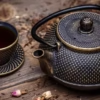 play_arrow
play_arrow
A Comprehensive Review of 3 Must-Have Tea Products on Amazon Mr. Tea Talk
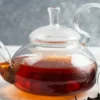 play_arrow
play_arrow
The Ultimate Guide to the Best Tea Essentials on Amazon: Kettles and Teapots You’ll Love Mr. Tea Talk
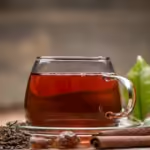 play_arrow
play_arrow
The Best Teapots for Tea Lovers: Silver vs. Borosilicate Glass Mr. Tea Talk
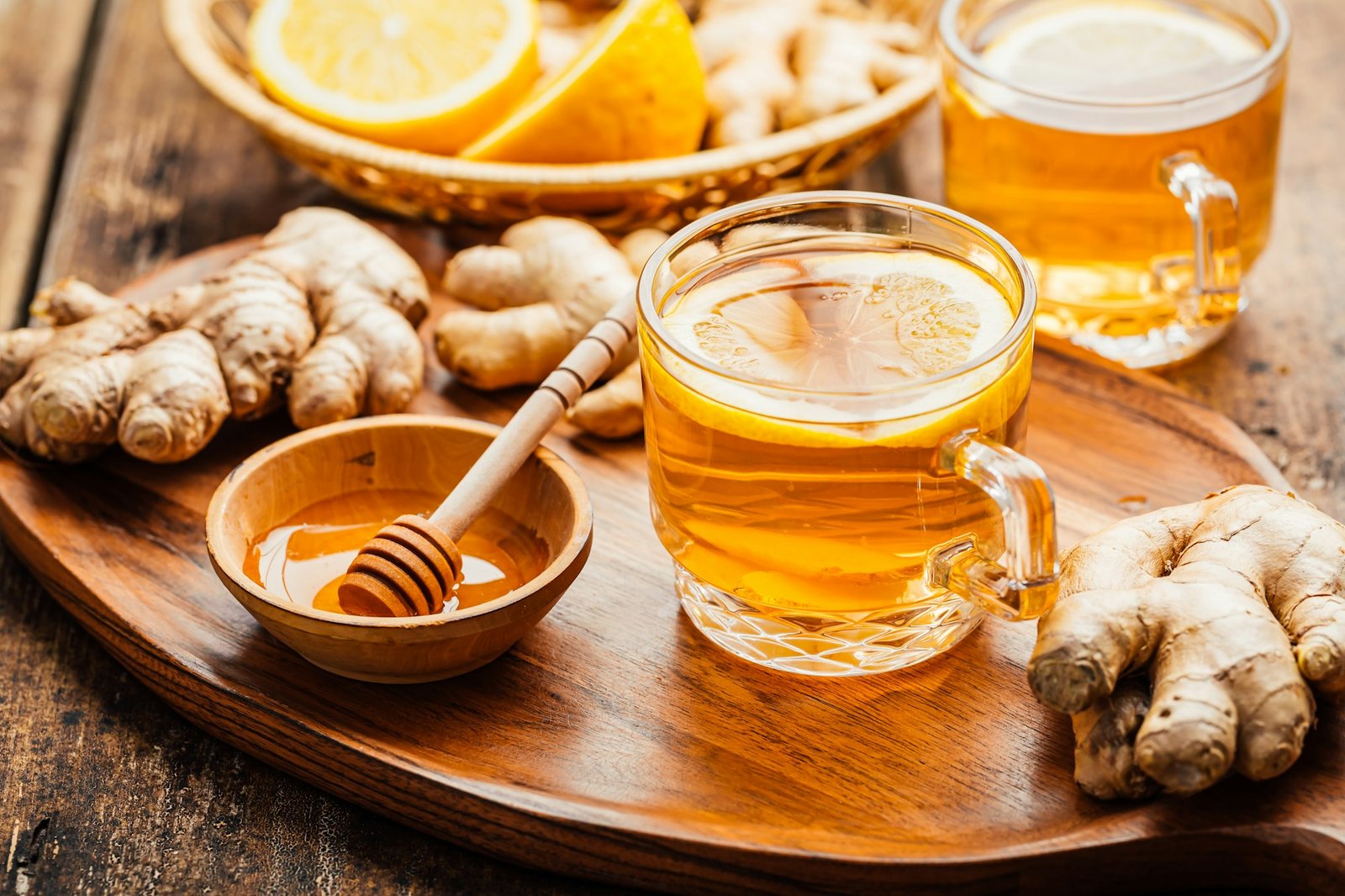
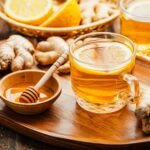 play_arrow
play_arrow
The Ultimate Guide to Ginger Tea Mr. Tea Talk
Ginger Tea, celebrated for its robust flavor and therapeutic properties, has long been a staple in tea blends worldwide. From its origins in ancient Asia to its global popularity today, ginger enriches teas with its distinctive warmth and zesty kick. Whether enjoyed on its own or combined with complementary ingredients, ginger transforms tea into a rejuvenating elixir that nourishes both body and spirit.
Ginger (Zingiber officinale) has a rich and storied history that spans thousands of years, deeply embedded in traditional medicine and culinary arts. Originating in Southeast Asia, ginger has been used as a medicinal herb and a culinary spice since ancient times. The earliest records of ginger use date back to the ancient Chinese and Indian civilizations, where it was revered for its healing properties. In traditional Chinese medicine, ginger was used to treat a variety of ailments, including digestive issues, nausea, and inflammation. Similarly, in Ayurveda, the traditional system of medicine in India, ginger was considered a key ingredient for promoting overall health and well-being.
As trade routes expanded, ginger became one of the most sought-after commodities, transported by traders across Asia, the Middle East, and Europe. The ancient Greeks and Romans were introduced to ginger through trade with the East, and it quickly became a luxury item in their culinary and medicinal practices. During the medieval period, ginger was highly prized in Europe, often used in sweets and savory dishes, and even as a form of currency.
Ginger’s journey from ancient trade routes to modern tea blends reflects its enduring appeal and versatility. Today, ginger continues to be a cherished ingredient in various cultures around the world. In Japan, pickled ginger (gari) is commonly served with sushi to cleanse the palate. In Caribbean cuisine, ginger is a staple in beverages and desserts. In the Middle East, ginger tea is enjoyed for its warming and soothing properties. This global appreciation highlights ginger’s significance not only for its flavor but also for its medicinal benefits, making it a cherished ingredient in herbal remedies and daily rituals.
Ginger is celebrated for its unique and complex flavor profile, which adds depth and character to tea blends. Known for its spicy, slightly sweet flavor, ginger provides a distinctive warmth that is both invigorating and comforting. The flavor of ginger can vary depending on its form and preparation method:
The aromatic notes of ginger are diverse, ranging from earthy and pungent to subtly floral, depending on the variety and how it is prepared. Fresh ginger often has a zesty, almost lemony aroma, while dried ginger exudes a deeper, more resinous scent. When steeped in hot water, ginger releases its essential oils, creating a fragrant infusion that lingers pleasantly on the palate.
Ginger’s ability to harmonize with other ingredients makes it a versatile addition to tea blends. It pairs well with a variety of flavors, including citrus, mint, honey, cinnamon, and other spices, enhancing both sweet and savory profiles. Whether enjoyed on its own or combined with complementary ingredients, ginger transforms tea into a rejuvenating elixir that nourishes both body and spirit.
Ginger’s historical and cultural legacy, combined with its unique flavor profile and therapeutic properties, underscores its timeless appeal. As a key ingredient in tea blends, ginger continues to captivate tea enthusiasts around the world. Its rich history, diverse flavors, and health benefits make ginger an indispensable part of tea culture, offering a holistic experience that transcends mere taste. Embrace the essence of ginger in your tea rituals and savor the rich, warming flavors that this ancient spice brings to every cup.
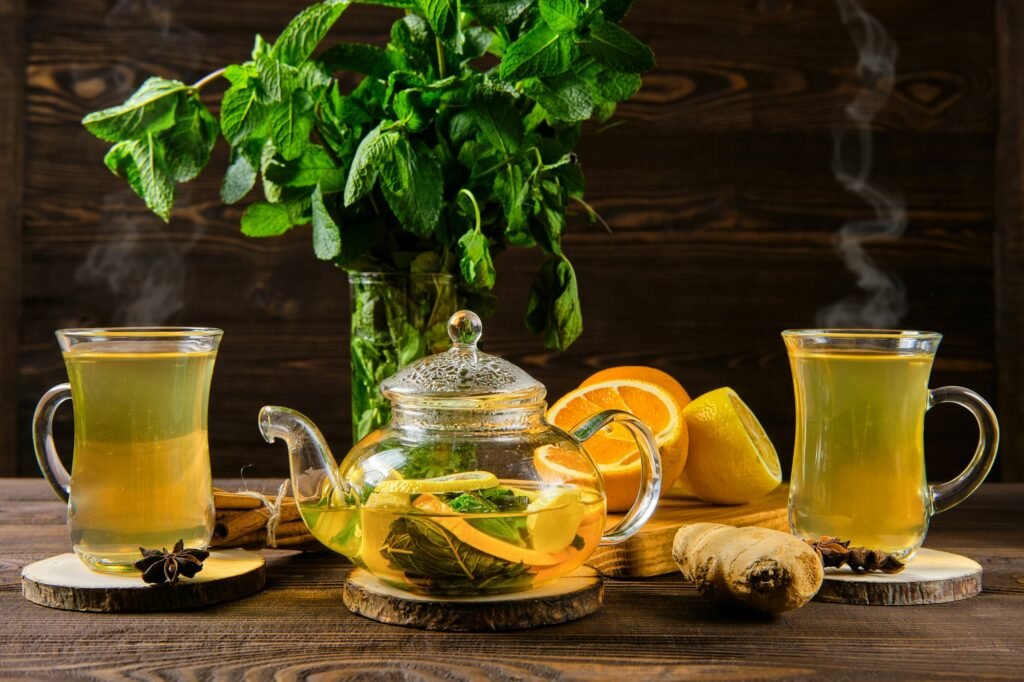
Ginger is renowned for its digestive properties, making it a go-to remedy for alleviating nausea, indigestion, and stomach discomfort. When ginger is steeped in hot water to make tea, it releases active compounds such as gingerol and shogaol. These compounds are known for their ability to promote healthy digestion and soothe gastrointestinal distress. Gingerol and shogaol help stimulate the production of digestive enzymes, which in turn aids in the breakdown and assimilation of food. This can be particularly beneficial for individuals experiencing bloating, gas, or cramping after meals.
Ginger tea is also effective in combating nausea and vomiting, making it a popular remedy for morning sickness during pregnancy, motion sickness, and chemotherapy-induced nausea. Its antiemetic properties work by blocking serotonin receptors in the stomach lining, which helps prevent the sensation of nausea. Additionally, ginger tea can enhance appetite and improve the overall digestive process, contributing to better nutrient absorption and gastrointestinal health.
Ginger tea is rich in antioxidants, which play a crucial role in protecting the body from oxidative stress and inflammation. Oxidative stress occurs when there is an imbalance between free radicals and antioxidants in the body, leading to cellular damage. The antioxidants in ginger, including gingerol, help neutralize free radicals, thereby reducing oxidative stress and preventing chronic diseases such as heart disease, cancer, and neurodegenerative disorders.
Gingerol, the primary bioactive compound in ginger, exhibits potent anti-inflammatory properties. It inhibits the production of pro-inflammatory cytokines and enzymes, which are responsible for the inflammatory response in the body. Regular consumption of ginger tea can help manage inflammatory conditions such as arthritis, muscle soreness, and joint pain. It can also be beneficial for individuals with chronic inflammatory diseases like rheumatoid arthritis and inflammatory bowel disease (IBD), as it helps reduce pain and improve mobility.
Ginger tea is a powerful ally in supporting immune function, thanks to its antimicrobial and antiviral properties. Regular consumption of ginger tea can help strengthen the body’s defenses against infections and promote overall wellness, particularly during cold and flu seasons. The active compounds in ginger, such as gingerol and zingerone, have been shown to inhibit the growth of various bacteria and viruses, including those responsible for respiratory infections.
Ginger tea also contains high levels of vitamin C and other essential nutrients that support the immune system. Vitamin C is known for its ability to enhance the production and function of white blood cells, which are crucial for fighting off infections. The warming properties of ginger tea help increase circulation and promote sweating, which can aid in the elimination of toxins and support the body’s natural detoxification processes.
Additionally, ginger tea can help alleviate symptoms of respiratory infections, such as congestion, sore throat, and coughing. Its anti-inflammatory and soothing properties help reduce inflammation in the respiratory tract and provide relief from irritation. Drinking ginger tea regularly can help maintain a strong immune system, reduce the duration and severity of colds and flu, and promote overall health and vitality.
The health benefits of ginger tea are extensive, making it a valuable addition to any wellness routine. From supporting digestion and alleviating nausea to reducing inflammation and boosting the immune system, ginger tea offers a holistic approach to health. Its therapeutic properties, combined with its delicious and warming flavor, make ginger tea a rejuvenating elixir that nourishes both the body and spirit. Embrace the benefits of ginger tea and enjoy a cup of this ancient remedy to enhance your well-being and overall health.
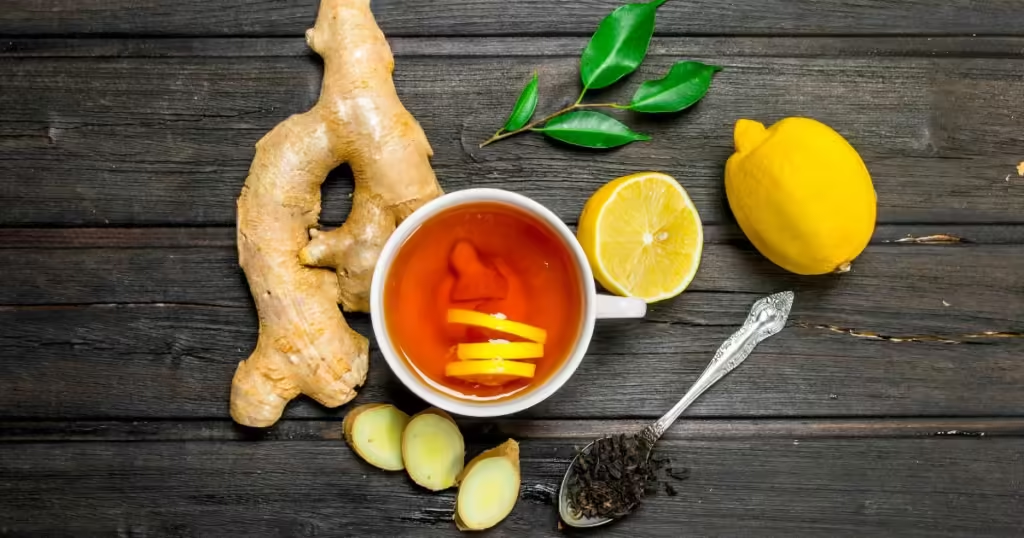
Ginger is a remarkably versatile ingredient that enhances a wide range of tea blends, from spicy chai to soothing herbal infusions. Its robust flavor profile allows it to harmonize beautifully with various other ingredients, creating diverse and delightful flavor combinations. Here are some popular pairings:
In tea blends, ginger serves as a balancing element, adding depth and warmth without overpowering other flavors. It plays a crucial role in both sweet and savory dishes, making it a valuable ingredient in culinary creations beyond traditional tea preparations.
Ginger’s versatility and ability to complement other flavors make it an indispensable ingredient in both tea and culinary arts. Whether you’re crafting a refreshing iced tea or a hearty stew, ginger’s distinctive warmth and zesty kick can elevate any dish, creating a memorable and satisfying experience.
Selecting Quality Ginger For optimal flavor and health benefits, choose fresh, organic ginger root from reputable sources. Ensure the ginger is firm and free from mold or blemishes, as quality directly impacts the taste and efficacy of ginger tea.
Brewing Techniques To extract the full spectrum of ginger’s flavors and benefits, follow these brewing tips:
Starting your day with a revitalizing cup of ginger tea can be a transformative ritual. The invigorating aroma and spicy notes of ginger tea awaken the senses, providing a natural energy boost without the need for caffeine. The warmth of the tea helps stimulate the digestive system, preparing your body for the day ahead. Drinking ginger tea in the morning can aid in digestion, reduce bloating, and promote a healthy metabolism. Additionally, the anti-inflammatory properties of ginger can help reduce morning stiffness and muscle soreness, making it an excellent choice for those looking to start their day on a positive and health-conscious note.
For an extra boost, you can enhance your morning ginger tea with a squeeze of fresh lemon juice and a teaspoon of honey. This combination not only adds flavor but also provides additional health benefits, such as vitamin C from the lemon and antibacterial properties from the honey. This morning ritual can become a cherished moment of mindfulness, allowing you to set a positive tone for the day ahead.
In the evening, a soothing mug of ginger tea can be the perfect way to unwind and relax after a long day. The comforting warmth of ginger tea fosters relaxation, making it an ideal bedtime beverage for promoting restful sleep. Ginger’s muscle-relaxing properties can help alleviate tension and stress, creating a sense of calm and tranquility. This is particularly beneficial for individuals who experience muscle aches or tension due to physical activity or stress.
Ginger tea also aids in digestion, making it an excellent choice for an after-dinner drink. It can help ease any discomfort or bloating that may occur after a meal, ensuring a more comfortable and restful night. For a more indulgent evening treat, consider adding a splash of warm milk and a dash of cinnamon to your ginger tea. This creates a creamy and aromatic beverage that not only tastes delicious but also enhances the tea’s relaxing properties.
Incorporating ginger tea into your evening routine can become a comforting ritual that signals the end of the day and prepares your body and mind for a good night’s sleep. The anti-inflammatory and soothing properties of ginger can help reduce any lingering discomfort or stress, allowing you to drift off into a peaceful slumber.
Embracing ginger tea as part of your daily routine can significantly enhance your overall well-being. Whether enjoyed as a revitalizing morning ritual or a soothing evening indulgence, ginger tea offers a holistic approach to health and relaxation. Its unique combination of flavor and therapeutic properties makes it a versatile and beloved beverage in tea culture. By incorporating ginger tea into your daily rituals, you can experience the myriad benefits of this ancient elixir, from improved digestion and reduced inflammation to enhanced relaxation and better sleep. Savor the rich, warming flavors of ginger tea and enjoy the nurturing experience it brings to your body and spirit.
Ginger’s role as a tea ingredient goes beyond its culinary appeal, offering a holistic approach to wellness and flavor. This ancient spice enriches teas with its distinctive warmth and zesty kick while providing numerous health benefits. Whether enjoyed for its digestive support, immune-boosting properties, or simply its unique taste, ginger tea captivates tea enthusiasts worldwide.
Ginger tea aids digestion, soothes stomach discomfort, and alleviates nausea, making it a comforting choice for any time of day. Its anti-inflammatory and antioxidant properties help manage conditions like arthritis and muscle soreness while promoting overall wellness.
Additionally, ginger tea strengthens the immune system, offering natural protection against infections, especially during cold and flu seasons. By incorporating ginger tea into your routine, you can support your health in a delicious way.
Ginger’s versatility in tea blends allows for endless flavor combinations. Whether paired with lemon, honey, or mint, ginger enhances various ingredients, creating delightful and diverse teas.
Embrace the enriching experience of ginger tea. Let it be part of your morning rituals for a natural energy boost and aid in digestion, or enjoy it as a comforting evening companion to relax and unwind. Savor the rich flavors and therapeutic properties of ginger tea, and partake in the timeless tradition of this ancient spice. If you would like to read articles like this , please visit out Tea Categories section.
Tagged as: Ginger Tea.

Honey Ginger Lemon Tea is a soothing and invigorating beverage that combines the warmth of ginger with the tangy freshness of lemon and the sweetness of honey. This tea is […]
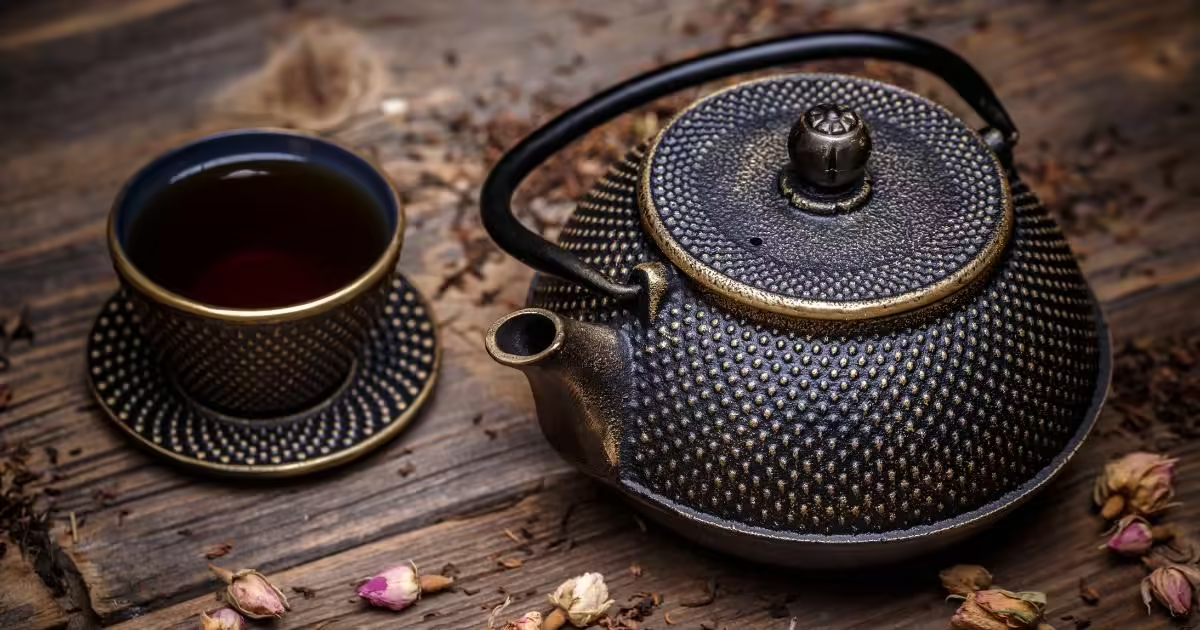

Copyright | Ceylon Wild Tea - All Rights Reserved | 2025
Post comments
This post currently has no comments.